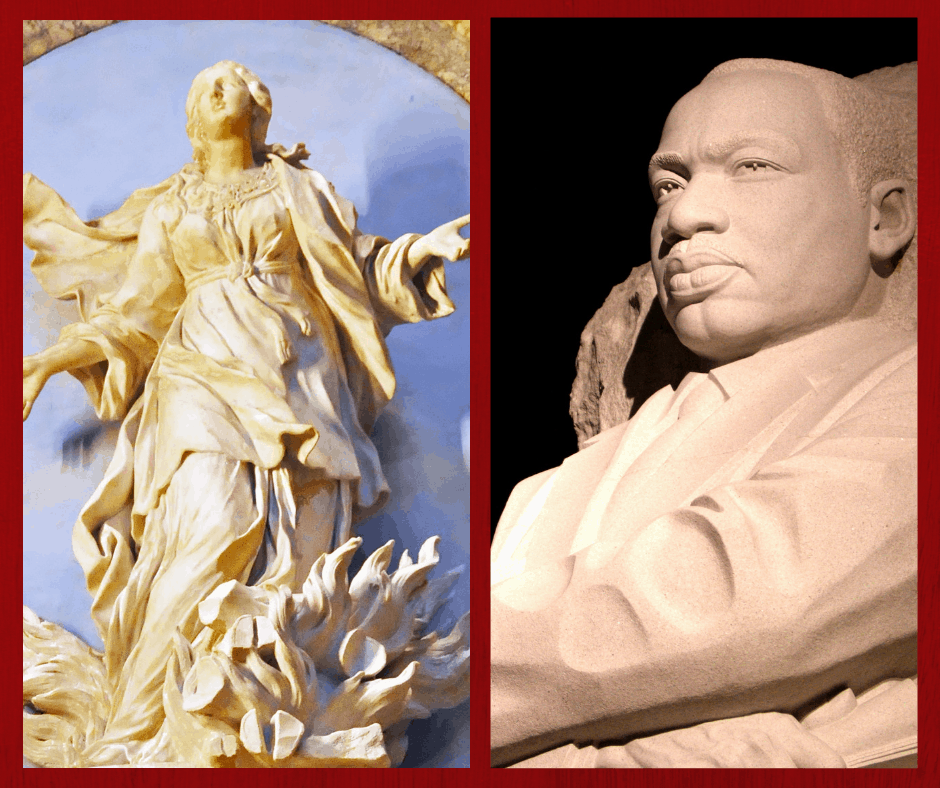In the Gospel this past Sunday, Jesus announced his mission to the world. And perhaps there are no better words to keep in mind as we begin Black History Month today:
He has sent me to proclaim liberty to captives
and recovery of sight to the blind,
to let the oppressed go free,
and to proclaim a year acceptable to the Lord. (Lk 4:18-19)
From the get-go, Jesus’ mission – and therefore the Christian mission – is about freedom.
The same message was clear a couple of weeks ago, on Martin Luther King Day, which in the Church also happened to be the feast of St. Agnes. Perhaps there is something to learn from the coincidence of these two celebrations – one of an early Christian martyr, one of a much more recent Christian martyr.
What could St. Agnes, killed in Rome around 304 A.D., and Dr. King, killed in Memphis in 1968, possibly have to teach us – not just as individual Christians but as a team of sorts, honored together, on January 21? After looking up the story of St. Agnes – appropriately, my Catholic education offered me many more lessons about Dr. King than about Agnes – I would suggest that these two martyrs remind us of the same powerful truth: Jesus’ mission, and therefore the Christian mission, is about freedom.
Ancient as St. Agnes is, it is hard to really know any of the specifics around her death. What is clear, though, is that she was a beautiful young girl – 12 or 13 years old – desired by many so-called “noble” men around Rome. But she had devoted herself to Christianity, considered herself Christ’s bride, and would give herself over to no man. Jealous, these men turned her in as a Christian, and had her put to death.
Now this sounds like a rather old-fashioned tale, with plenty of potential for sexist interpretations that teach young girls – of whom St. Agnes is a patron – that it is better to die than to lose your virginity. I can’t deny that. I am sure the story of St. Agnes has been used to teach such lessons, and maybe it is still used that way today. But it does not have to be. As Robert Ellsberg puts it in his book on Women Saints, Prophets, and Witnesses for Our Time:
In the story of Agnes the opposition is not between sex and virginity. The conflict is between a young woman’s power in Christ to define her own identity versus a patriarchal culture’s claim to identify her in terms of her sexuality. According to the view shared by her “suitors” and the state, if she would not be one man’s wife, she might as well be every man’s whore. Failing these options, she might as well be dead. Agnes did not choose death. She chose not to worship the gods of her culture. … Espoused to Christ, she was beyond the power of any man to “have his way with her.” “Virgin” in this case is another way of saying, “Free Woman.”
Agnes, in other words, pursued freedom, just like Christ. In a world that wished to judge her by appearance – Is she beautiful? Well, why doesn’t she have a man on her arm? – she rooted her identity in something much deeper: her relationship with Christ, and, one might say, the consequent content of her character. Did she pursue purity? Yes, of course – just like all good Christians do 1. And for her pursuit of Christian purity – her free pursuit of Christian purity, without fear of the consequences on her life – she was persecuted and martyred. This, too, makes her a good Christian – and, indeed, a saint 2.
Dr. King may not be a saint in the same way – technically, he can’t be, since he wasn’t a Catholic 3 – but like St. Agnes, he was certainly a persecuted Christian and a martyr. He, too, pursued Christian freedom – the freedom of all persons not to be defined by such superficial things as the color of their skin. It was Dr. King, of course, who famously articulated that a person’s value comes from the content of their character – from the state of their heart, from their pursuit of the purity and righteousness of God. As did St. Agnes, Dr. King showed us by example that we ought to pursue such purity and righteousness freely, without fear of the consequences – without fear, even of death.
This is, of course, what Jesus did. He proclaimed liberty to the captives, recovery of sight to the blind, and freedom to the oppressed, and he did so until the civil and religious authorities of his time could take it no longer. He did so until he was killed. St. Agnes and Dr. King followed in his footsteps. They, too, had the freedom – from fear of the new, of the uncomfortable, and even of death – to pursue freedom for the oppressed.
Sadly, the pursuit of freedom is not finished. People of color still face oppression. Young women still live in a culture that hyper-sexualizes the female body. Indeed, our world is filled with people who are “captives” in some way or another – whether they be migrants seeking asylum, addicts who cannot break free from a drug, or anyone else feeling trapped by systems and cycles that offer little hope to those in need. Consequently, the combined examples of Dr. King, St. Agnes, and Jesus himself are still relevant – and much needed – today.
//
Cover image courtesy of FlickrCC users Dennis Jarvis and Gage Skidmore.
- Jesus said, “Blessed are the pure in heart, for they shall see God.” (Mt 5:8 NRSV). ↩
- Jesus also said, “Blessed are they who are persecuted for righteousness’ sake, for theirs is the kingdom of heaven.” (Mt 5:10 NRSV) ↩
- But try telling that to my freshman theology students, many of whom objected vociferously when I tried to explain that he wasn’t a saint! To their credit, he does have icons… ↩


